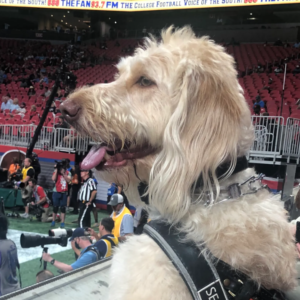Attending a thrilling sporting event might seem like a dream come true for many, but for individuals with disabilities, it can pose significant challenges. Imagine navigating through a bustling stadium, taking in the cheers and excitement while dealing with loud noises and complex surroundings. This is where service dogs step in as indispensable companions, offering vital assistance and support to their handlers, allowing them to relish these events with ease and confidence.
Access and Navigation
Primarily, service dogs excel in aiding their handlers to access and navigate sprawling sporting venues. Maneuvering through packed stadiums can be overwhelming, especially for individuals with visual impairments, mobility limitations, or other disabilities. Service dogs are trained to guide their handlers to their seats, dodge obstacles, and navigate through crowds safely, ensuring a smoother and hassle-free experience.
Emotional Support and Anxiety Reduction
Sporting events are notorious for their boisterous and chaotic atmosphere, which can trigger anxiety and stress for some attendees. Service dogs offer a calming presence and emotional support, proving to be a reliable source of comfort. For individuals battling conditions like PTSD, autism, or severe anxiety, the mere presence of a service dog can be the deciding factor between seizing the moment or staying back home.
Medical Assistance
The significance of service dogs extends beyond emotional support. They are trained to carry out specific tasks that can be life-saving in critical situations. Individuals with medical conditions such as diabetes, epilepsy, or severe allergies benefit greatly from service dogs, as these furry companions can detect subtle changes in their handler’s condition and preemptively alert them, averting potential emergencies at sporting events.
Enhanced Independence
Accompanying a service dog to a sporting event empowers the handler with a newfound sense of independence. Rather than relying on others or event staff for support, individuals with disabilities can count on their service dogs to cater to their needs. This fosters autonomy and self-assurance, enabling them to actively engage in the event without feeling dependent on external assistance.
Legal Rights and Accessibility
Thanks to the Americans with Disabilities Act (ADA), service dogs are granted access to all public spaces, including sporting events. This legal protection ensures that handlers can bring their service dogs to stadiums and arenas without being subjected to discrimination. Event organizers are obligated to make accommodations for service dogs, guaranteeing individuals with disabilities an equal opportunity to partake in the event’s festivities.
Tips for Attending Sporting Events with a Service Dog
– Plan Ahead: Familiarize yourself with the venue’s policies for service dogs and inform the staff about your companion’s presence and your specific requirements.
– Stay Calm: Sporting events can be overwhelming, so maintaining a composed demeanor is key to helping your service dog stay focused.
– Bring Essentials: Pack necessary supplies for your service dog, including water, snacks, and waste disposal bags, to ensure their comfort during the event.
– Advocate for Your Rights: In case of any challenges or resistance from event staff, assert your ADA rights confidently by explaining your service dog’s role and the legal protections they are entitled to.
In sum, service dogs are integral in enabling individuals with disabilities to savor the excitement and camaraderie of sporting events. By offering vital support in various aspects such as navigation, emotional well-being, medical alerts, and independence, service dogs pave the way for their handlers to actively participate and enjoy these events safely. Understanding the legal framework and taking practical considerations into account ensures a positive and inclusive experience for all attendees.
